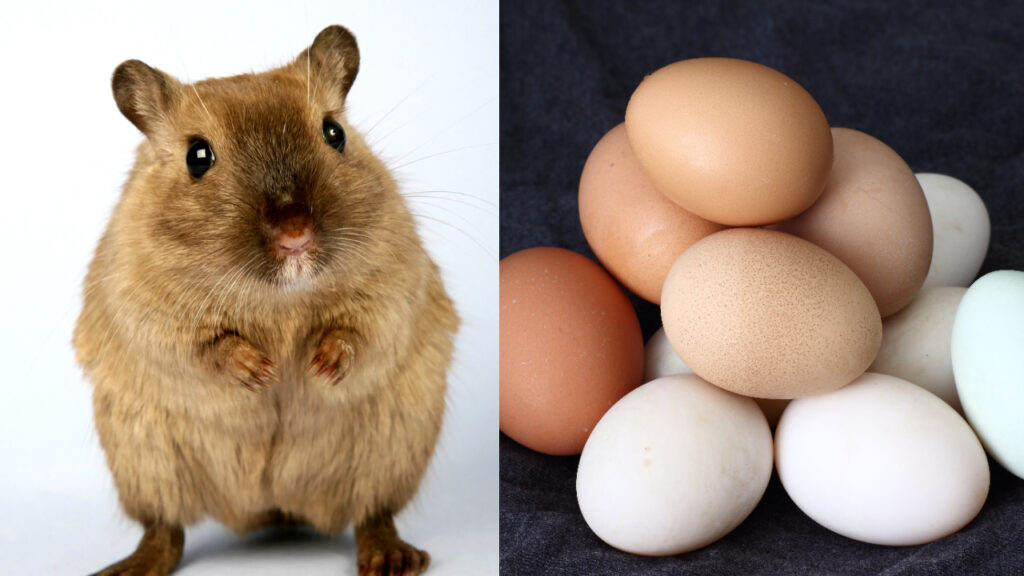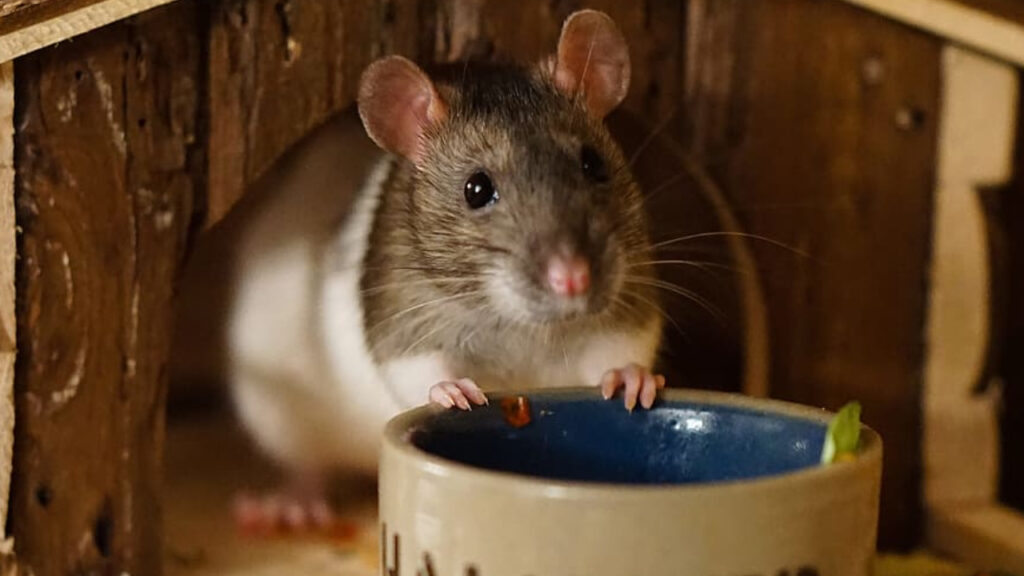
Eggs are reproductive bodies laid by female animals, and they serve as a primary source of nutrition for the developing embryos. In the context of our previous discussion, we were specifically referring to chicken eggs, which are commonly consumed by humans.
But can rats eat them too?
Yes, rats can eat eggs, and many pet owners offer eggs as a part of their rats’ diet. Eggs are high-quality protein, essential amino acids, and vitamins. However, it’s crucial to provide eggs in moderation and ensure they are cooked and prepared in a way that minimizes potential health risks.
In this article, we will learn more about eggs and how it can benefit your rats.
Table of Contents
Can Rats Eat Eggs?
Rats can eat eggs, and they actually really like them!
You can give them boiled eggs or scrambled eggs. Just make sure the eggs are cooked, so no raw eggs, okay? Raw eggs can be a bit tricky for their tummies.
Eggs are like a protein-packed snack for your rat friend. It helps them stay strong and healthy, just like how eating your veggies helps you grow big and strong.
So, if you ever want to treat your rat to something special, sharing a bit of cooked egg can be a great idea!
Just remember, like with any treat, it’s good to give it to them in moderation.
And there you have it – eggs can be a tasty and healthy addition to your rat’s menu!
Can Rats Eat Both Cooked and Raw Eggs?

It’s generally safer for rats to eat cooked eggs rather than raw ones.
When eggs are cooked, it helps to kill any harmful bacteria that might be present.
Raw eggs, on the other hand, might have some bacteria that could make your rat feel a bit sick.
So, it’s better to stick with eggs that have been cooked. Whether they are boiled or scrambled, the cooking process makes them a safe and yummy treat for your little furry friend.
So, cooking them makes it a safer and delicious option!
Also Read: Can Rats Eat Shrimp? [Find Out Now!]
Is Egg Healthy for Rats?
Yes, eggs can be beneficial for rats when included as part of a balanced diet.
A typical serving of eggs (Per 1 Medium, 44g) contain:
- Calories: 68 kcal
- Protein: 5.54 grams
- Fat: 4.8 grams
- Cholesterol: 186 mg
- Carbohydrates: 0.6 grams
- Sugars: 0.6 grams
- Fiber: 0 grams
Other benefits of eggs may include:
Protein Source
Eggs are a rich source of high-quality protein.
Protein is essential for muscle development, growth, and overall health in rats.
Vitamins
Eggs contain various vitamins, including vitamin A, vitamin D, vitamin E, and B-complex vitamins.
These vitamins are crucial for maintaining the rat’s overall health, immune system, and skin condition.
Minerals
Minerals such as iron, zinc, and phosphorus are present in eggs.
These minerals play a role in bone health, blood circulation, and metabolic processes.
Omega-3 Fatty Acids
Eggs, especially those from pasture-raised or omega-3 enriched sources, can provide omega-3 fatty acids.
These fatty acids contribute to cardiovascular health and may have anti-inflammatory effects.
Risks of Overfeeding Eggs to Rats
While eggs can offer some nutritional benefits to rats when provided in moderation, overfeeding or giving them excessive amounts of eggs can pose certain risks.
Here are some potential risks of overfeeding eggs to rats:
High Cholesterol
Eggs are high in cholesterol, and excessive consumption may contribute to elevated cholesterol levels in rats.
High cholesterol can be linked to cardiovascular issues and may impact the overall health of the rat.
Obesity
Eggs are relatively calorie-dense, and overfeeding can lead to an excess intake of calories.
This can result in weight gain and potentially lead to obesity, which is associated with a range of health problems in rats, including cardiovascular issues and joint problems.
Digestive Issues
Rats have sensitive digestive systems, and sudden or excessive changes in diet can lead to digestive upset.
Overfeeding eggs may cause diarrhea or other gastrointestinal problems in rats.
Allergies
Some rats may develop allergies to specific foods, including eggs.
Overfeeding eggs increases the risk of allergies, which can manifest as skin issues, respiratory problems, or digestive disturbances.
So, it’s crucial to provide a balanced and varied diet that includes a mix of rat pellets, fresh fruits, vegetables, and occasional treats like eggs.
How Many Eggs Can Rats Have?

Just like you have limits on how many cookies or candies you can eat, rats also need to have eggs in moderation.
It’s like giving them a special treat, and we want to make sure they stay healthy.
For most pet rats, a small amount of egg a couple of times a week is a good rule of thumb. You can think of it like having a special snack on certain days, but not every single day.
Too much of anything, even if it’s tasty, might not be good for their little bodies.
Remember, rats need a balanced diet with different types of food to stay healthy. Eggs are a nice source of protein for them, but they also need their regular rat food and some fresh fruits and veggies.
Preparing Eggs for Your Rats
When preparing eggs for your rats, it’s important to ensure that they are cooked and presented in a manner that minimizes potential health risks.
Here are some tips for preparing eggs for your pet rats:
- Cooking: you can boil the eggs until the yolks and whites are fully cooked. You can then let them cool before serving. Another option can be scrambling the eggs in a pan without adding oil or butter is another option.
- Avoid Additives: Do not add salt, pepper, or other seasonings when preparing eggs for your rats. Rats are sensitive to high levels of salt, and certain seasonings may not be suitable for them.
- Shell Removal: Remove the eggshell before offering the eggs to your rats. While some rats may nibble on the shell, it’s generally advisable to avoid providing it due to potential choking hazards.
Remember,offer eggs in moderation.
While eggs can be a nutritious addition to their diet, they should be treated as an occasional treat rather than a primary food source.
Can Rats Eat Egg Shells?

Rats can actually nibble on eggshells, and it’s okay for them in small amounts. Eggshells are a good source of calcium, which is like a superhero nutrient for their bones and teeth.
It’s like them munching on a little piece of a tiny, crunchy mineral cookie that’s good for their health.
But, and this is important, make sure the eggshells are clean and free of any leftover egg whites or yolks. You can even crush the shells into tiny pieces to make it easier for your rat to eat.
So, yes, rats can enjoy a bit of eggshell, but remember, it’s like a special extra, not their main meal.
Keep it as a crunchy treat every once in a while, and your rat will be one happy and healthy little chef!
Can Rats Eat Fried Eggs?
Rats can eat eggs, and fried eggs are no exception.
However, there are a few things to keep in mind.
While rats can enjoy the yummy goodness of fried eggs, it’s essential to make sure they are cooked without any added oils, butter, or seasonings.
Rats have sensitive tummies, and those extra ingredients can be a bit too much for them. So, plain and simple fried eggs are the way to go.
Also, remember that fried eggs, like any treat, should be given in moderation. Think of it like having a slice of pizza or a piece of cake—it’s delicious but not an everyday meal.
So, if you ever decide to share your breakfast with your rat friend, make sure it’s a plain, nicely cooked fried egg without any extras.
It’s like treating them to a little rat-friendly breakfast delight!
Can Rats Eat Boiled Eggs?
Absolutely!
Rats can indeed eat boiled eggs, and they tend to love them.
Boiled eggs are a fantastic treat for rats because they are not only delicious but also packed with protein. Protein is like the superhero nutrient that helps keep your rat strong and healthy.
When preparing boiled eggs for your rat, make sure they are plain and without any added ingredients like salt or seasoning.
You can offer your rat small pieces of the boiled egg as an occasional snack. It’s like treating them to a mini feast that’s both tasty and nutritious.
So, go ahead and share some boiled eggs with your rat friend – they’ll likely be thrilled!
What About Scrambled Eggs?
Rats can indeed eat scrambled eggs, and many of them really enjoy this treat.
Scrambled eggs are a great source of protein, which is important for keeping your rat healthy and happy.

When preparing scrambled eggs for your rat, it’s essential to cook them without any added oils, butter, or seasonings. Keep it simple, just like how you’d make it for yourself if you were preparing a special treat.
Offer your rat small portions of plain, scrambled eggs as an occasional treat. This way, it’s like they’re getting a tasty and nutritious reward for being such great little companions.
Remember, moderation is the key to a balanced and healthy diet for your furry friend!
Do Rats Like Chicken Eggs?
Rats may show interest in and eat chicken eggs, as eggs are a good source of protein.
In the wild, rats are opportunistic feeders and may consume a variety of foods, including eggs, if they come across them.
However, it’s important to note that preferences can vary among individual rats.
Rats may prefer eggs prepared in certain ways.
Some rats may enjoy boiled or scrambled eggs, while others may show interest in raw eggs. Ensure that any eggs offered are fresh and cooked to reduce the risk of contamination.
While eggs can be a nutritious addition to a rat’s diet, moderation is key.
Eggs Alternatives for Your Rats
If you’re looking for alternative treats for your pet rat, there are several options that can provide variety and nutritional benefits.
Here are some alternatives to eggs that your rat might enjoy:
- Cooked Chicken: Offer small pieces of cooked, boneless, and skinless chicken as a tasty and protein-rich treat.
- Turkey: Similar to chicken, small amounts of cooked turkey can be a nice alternative.
- Cheese: Rats generally enjoy cheese in moderation. Opt for low-fat varieties, and cut it into small, rat-sized portions.
- Nuts and Seeds: Small amounts of unsalted nuts and seeds, such as almonds, pumpkin seeds, or sunflower seeds, can be a crunchy and nutritious snack.
- Fresh Fruits and Vegetables: Offer a variety of fresh fruits and veggies, like apple slices, carrots, broccoli, or peas. These provide essential vitamins and minerals.
- Whole Grains: Cooked grains like rice or pasta, in small amounts, can be a good addition to their diet.
Remember, while offering treats, it’s crucial to maintain a balanced and healthy diet for your rat.
Moderation is key, and always ensure that the treats are safe and appropriate for rats.
Final Thoughts
To sum up, rats can indeed eat eggs and may benefit from the nutritional content, especially the high-quality protein, vitamins, and minerals found in eggs.
However, it’s crucial to offer eggs in moderation and as an occasional treat rather than a primary food source.
When preparing eggs for your rats, ensure they are cooked thoroughly, avoid adding seasonings, and remove the shell to prevent potential choking hazards.
Before you leave, here are other helpful articles:
